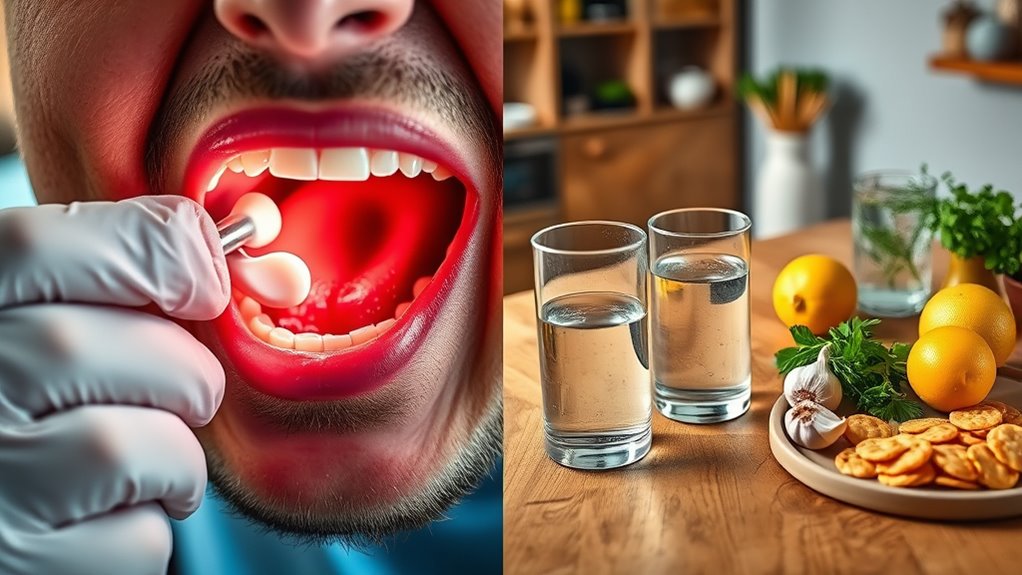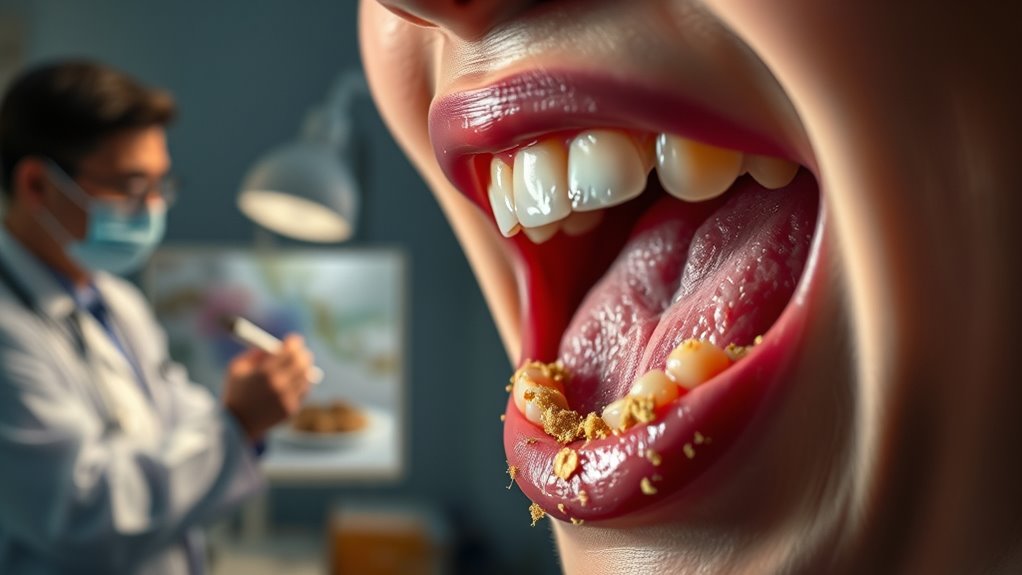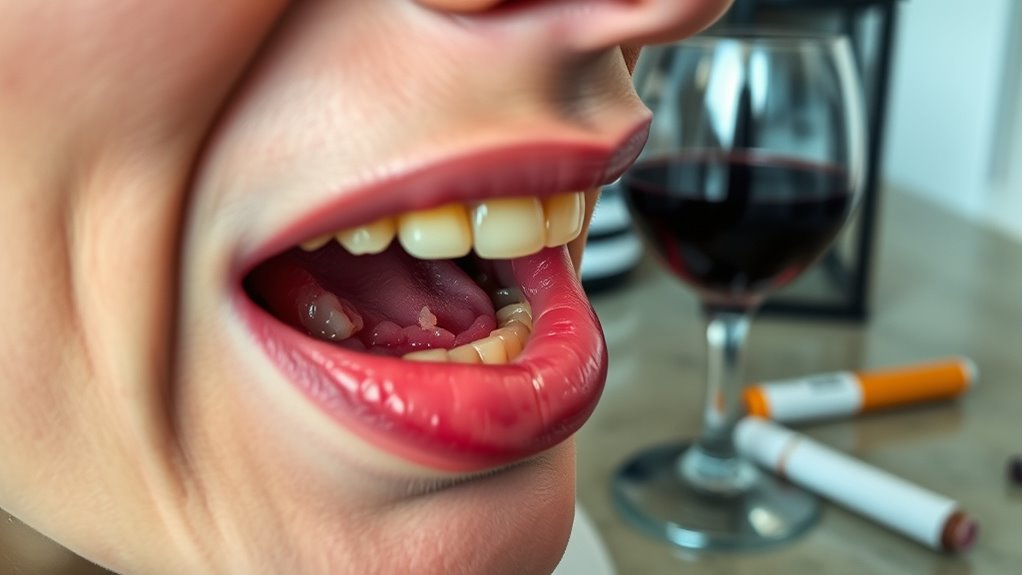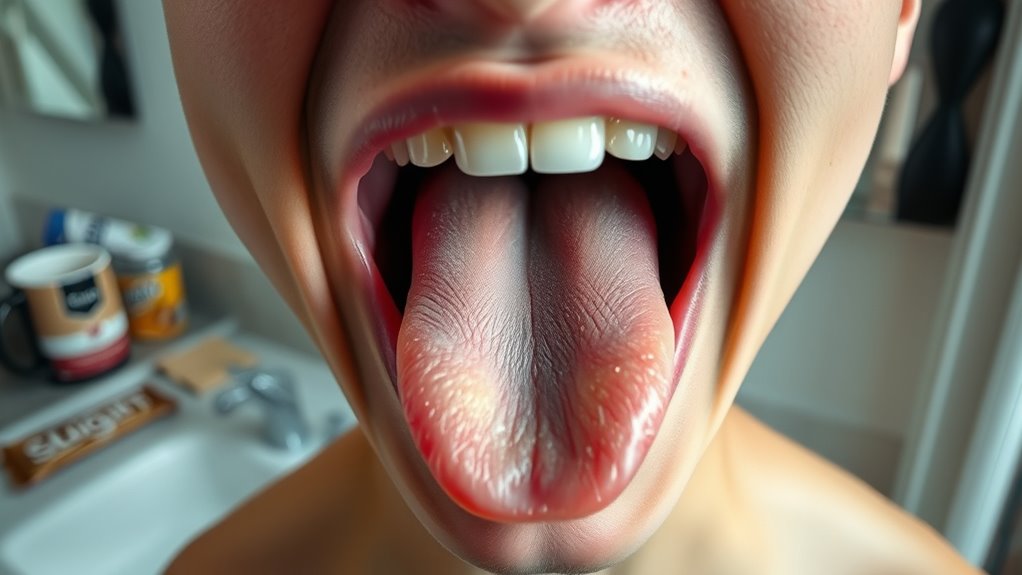Halitosis can stem from both medical conditions and lifestyle choices. Medical issues like infections, dry mouth, and systemic diseases such as diabetes, liver, or kidney problems can cause persistent bad breath even after good oral hygiene. On the other hand, lifestyle habits like smoking, certain foods, dehydration, and poor oral care also play a significant role. Understanding what’s behind your bad breath can help you find effective solutions—learn more to uncover the root cause.
Key Takeaways
- Medical causes include infections, systemic diseases, dry mouth from medication, and organ dysfunction, often with additional health symptoms.
- Lifestyle causes stem from poor oral hygiene, diet (garlic, onions), smoking, dehydration, and consumption of odorous foods or substances.
- Persistent halitosis despite good oral care suggests medical issues like sinus infections, diabetes, or liver problems.
- Lifestyle-related halitosis often improves with improved hygiene, dietary changes, quitting smoking, and hydration.
- Differentiating medical from lifestyle causes involves assessing associated symptoms, habits, and response to oral hygiene practices.
Medical Conditions That Contribute to Halitosis

Medical conditions often play a significant role in causing halitosis. If you have health issues like sinus infections, postnasal drip, or tonsillitis, you might notice persistent bad breath. Respiratory infections can produce foul-smelling bacteria, which contribute to halitosis. Additionally, conditions like diabetes can cause a fruity or acetone smell on your breath due to high ketone levels. Liver or kidney problems might also produce unique odors that linger even after brushing. Certain metabolic disorders can alter your body’s chemistry, leading to foul odors. Medications for these illnesses can further dry your mouth, worsening bad breath. Recognizing these medical links helps you understand that halitosis isn’t always just about oral hygiene but can reflect underlying health conditions that need medical attention. Maintaining overall health is essential in managing and preventing persistent bad breath caused by systemic issues.
Oral Health Issues as a Cause of Bad Breath

Your oral health plays a vital role in bad breath, especially if you neglect proper hygiene. Accumulated dental plaque and gum disease can produce strong odors that linger. Maintaining good brushing and flossing habits helps prevent these issues and keeps your breath fresh. Incorporating digital literacy into your routine can also help you stay informed about effective oral care practices.
Dental Plaque Accumulation
Dental plaque buildup is a common cause of bad breath because it provides a breeding ground for bacteria that produce foul odors. When you don’t brush and floss regularly, plaque forms on your teeth and along the gumline. This sticky film traps food particles and creates an environment where odor-causing bacteria thrive. Over time, plaque hardens into tartar, which is even harder to remove and further promotes bacterial growth. The bacteria break down food debris, releasing sulfur compounds and other volatile substances that cause persistent bad breath. To combat this, you should maintain good oral hygiene by brushing twice daily, flossing daily, and visiting your dentist regularly. Removing plaque effectively keeps bacteria in check and helps freshen your breath naturally. Additionally, regular professional cleanings are essential for professional dental care to thoroughly remove tartar buildup and prevent further oral health issues.
Gum Disease Effects
Gum disease, such as gingivitis and periodontitis, is a significant cause of bad breath because it involves inflammation and infection of the tissues supporting your teeth. When these conditions develop, bacteria thrive in the pockets between your gums and teeth, producing foul-smelling compounds. As the infection worsens, tissue breakdown releases sulfur compounds that intensify bad breath. You might notice persistent, foul odor even after brushing or freshening your mouth. Gum disease can also cause bleeding, swelling, and discomfort, further complicating oral health. If left untreated, the bacteria and toxins can spread, worsening your breath issues and risking tooth loss. Addressing gum disease promptly helps reduce bacteria and inflammation, improving both your oral health and fresh breath.
Oral Hygiene Practices
Poor oral hygiene habits are a common cause of bad breath, often stemming from inadequate removal of food particles and plaque. When you don’t brush twice daily and floss regularly, bacteria build up on your teeth and gums, producing foul-smelling compounds. Skipping mouthwash or neglecting your tongue also allows bacteria to thrive, worsening your breath. Using improper brushing techniques or failing to replace your toothbrush can reduce cleaning efficiency. Regular dental checkups help identify issues early, but good daily habits are essential. Ensuring you clean all mouth surfaces thoroughly, including your tongue and between teeth, can considerably reduce bad breath caused by poor oral hygiene. Maintaining consistent, proper oral care is your best defense against halitosis linked to oral health issues.
The Role of Systemic Diseases in Halitosis

You might notice bad breath that doesn’t improve with oral hygiene, which could be a sign of systemic diseases. For example, diabetes can cause a fruity or acetone-like odor, while liver issues may produce a distinct, foul smell. Recognizing these clues can help you identify underlying health problems that contribute to halitosis.
Diabetes and Breath Odor
Diabetes can considerably influence breath odor because elevated blood sugar levels lead to the production of ketones, which emit a distinctive fruity or acetone smell. When your body lacks insulin or can’t use it effectively, it begins breaking down fat for energy, producing ketones as a byproduct. These ketones then circulate in your bloodstream and are exhaled through your lungs, giving your breath a sweet, fruity odor. This is often a sign of uncontrolled diabetes or diabetic ketoacidosis, a serious condition requiring immediate medical attention. Besides the smell, you might notice other symptoms like dry mouth, increased thirst, or frequent urination. Monitoring blood sugar levels and maintaining proper diabetes management can help prevent these odor changes and associated health risks. Additionally, understanding how systemic diseases impact overall health can aid in recognizing and managing conditions that contribute to halitosis.
Liver Disease Indicators
Liver disease can cause distinctive changes in breath odor due to its impact on the body’s ability to process toxins. When the liver isn’t functioning properly, waste products like ammonia accumulate, leading to a characteristic foul smell often described as musty or fishy. Recognizing these indicators can help you identify systemic health issues. The following table highlights common liver disease indicators:
| Symptom | Breath Indicator | Additional Signs |
|---|---|---|
| Elevated ammonia | Foul, musty odor | Jaundice, fatigue |
| Liver failure | Fishy or sweet scent | Swelling, abdominal pain |
| Cirrhosis | Unpleasant breath with metallic notes | Bleeding tendencies |
If you notice these signs, consult a healthcare professional promptly.
How Diet Influences Breath Odor

Diet plays a substantial role in shaping your breath odor, as certain foods can produce compounds that linger in your mouth and are released when you breathe out. Foods like garlic and onions contain sulfur compounds that can cause persistent bad breath even after brushing. Citrus fruits and spicy foods also contribute by increasing saliva production, which can temporarily mask odors but may lead to dry mouth later. Sugary snacks promote bacterial growth, worsening halitosis. Additionally, high-protein diets can cause the mouth to produce more volatile sulfur compounds during digestion. To reduce bad breath, consider limiting these foods and maintaining good hydration. Proper oral hygiene, combined with mindful eating, can considerably improve your breath’s freshness and help prevent lifestyle-related halitosis. Being aware of dietary influences can help you make better choices to combat halitosis effectively.
Smoking and Its Impact on Oral Freshness

Smoking profoundly impacts your oral freshness, often overshadowing the effects of your diet. When you smoke, the chemicals in cigarettes stick to your teeth, tongue, and gums, causing persistent bad odors. Nicotine reduces saliva flow, leading to dry mouth, which creates an ideal environment for odor-causing bacteria to thrive. Additionally, tobacco stains your teeth and irritates your oral tissues, worsening halitosis. Even if you maintain good oral hygiene, smoking introduces new odor sources that are notably difficult to eliminate. The lingering smell of smoke also clings to your breath and clothing, making fresh breath a challenge. Quitting smoking not only benefits your overall health but also considerably improves your oral freshness, restoring a cleaner, more confident smile. Understanding oral health can help you take effective steps toward better oral hygiene and fresh breath.
The Effect of Poor Oral Hygiene on Halitosis

Poor oral hygiene is a primary contributor to halitosis because neglecting regular brushing and flossing allows food particles and bacteria to accumulate in your mouth. This buildup creates an environment where odor-causing bacteria thrive, leading to persistent bad breath. When you skip brushing, plaque and leftover food remain on your teeth and tongue, providing fuel for bacterial growth. Over time, this results in a foul smell that’s hard to eliminate. Maintaining good oral hygiene helps remove these particles and bacteria, reducing halitosis. To improve your breath, consider the following:
- Brushing twice daily with fluoride toothpaste
- Flossing daily to remove debris between teeth
- Cleaning your tongue regularly
- Visiting your dentist for professional cleanings
- Using an air purifier to reduce airborne allergens and bacteria that can contribute to bad breath.
Medications and Substances That Cause Bad Breath

Certain medications and substances can also cause bad breath even if your oral hygiene is impeccable. Many prescription drugs, like antihistamines, diuretics, and antidepressants, can reduce saliva production, leading to dry mouth, which promotes bacterial growth and odor. Some medications contain chemicals that break down in your mouth, releasing foul odors. Additionally, substances like tobacco and alcohol can contribute to bad breath by drying out your mouth and introducing strong odors. Over-the-counter medications, such as certain pain relievers, may also have side effects that affect your breath. If you notice persistent bad breath after starting a new medication, consult your healthcare provider. They may adjust your dosage or suggest alternatives to help manage the odor without compromising your treatment. Incorporating AI in Business tools can also help monitor and manage medication side effects more effectively.
Lifestyle Habits That May Worsen Halitosis

Lifestyle habits can considerably impact the severity of halitosis, especially when habits like neglecting oral hygiene or consuming specific substances become routine. Poor dental care allows bacteria to thrive, creating foul odors. Smoking and tobacco use dry out the mouth, reducing saliva that naturally cleanses the tongue and teeth. Consuming sugary foods and drinks promotes bacterial growth, worsening bad breath. Additionally, eating odor-causing foods like garlic and onions can leave lingering smells. Failing to stay hydrated results in a dry mouth, which worsens halitosis. To minimize this, brush and floss regularly, stay hydrated, avoid tobacco, and limit intake of odorous foods. Incorporating Glycolic Acid into skincare routines may improve skin texture, but it’s important to note that certain products can sometimes cause irritation if used improperly. These habits directly influence your breath’s freshness and overall oral health, making lifestyle choices vital in managing halitosis.
Differentiating Between Medical and Lifestyle-Related Causes

To effectively address halitosis, it’s important to distinguish between medical and lifestyle-related causes, as each requires different approaches. If your bad breath persists despite good oral hygiene and avoiding known triggers, it might be due to underlying medical issues. Medical causes often involve infections, dry mouth, sinus problems, gastrointestinal issues, or systemic conditions like diabetes. These typically present with other symptoms, such as sore throat, nasal congestion, or unusual tastes. On the other hand, lifestyle-related causes stem from habits like poor oral hygiene, smoking, certain foods, or dehydration. Recognizing the pattern—whether halitosis improves with better hygiene or only after lifestyle changes—helps you and your healthcare provider determine the root cause. Accurate differentiate ensures targeted treatment, leading to more effective relief. Additionally, understanding the toilet flushing mechanisms and proper disposal practices can contribute to overall health and hygiene, indirectly influencing conditions like halitosis.
Frequently Asked Questions
Can Anxiety or Stress Cause Persistent Bad Breath?
Yes, anxiety or stress can cause persistent bad breath. When you’re anxious, your body produces more saliva, which can dry out your mouth, leading to bacteria buildup and bad odor. Stress might also increase acid production in your stomach, contributing to bad breath. You might not realize it, but these emotional states can directly impact your oral health. Managing stress through relaxation techniques can help reduce your bad breath.
How Does Dehydration Contribute to Halitosis?
Imagine you’re unaware of how dehydration quietly worsens your breath. When you don’t drink enough water, your mouth produces less saliva, creating a dry environment. This dryness allows bacteria to thrive, releasing foul odors. As a result, your breath becomes unpleasant. Staying hydrated keeps your mouth moist, washes away odor-causing bacteria, and helps maintain fresh breath. Don’t underestimate the power of water—it’s your first line of defense against persistent bad breath.
Do Certain Dental Appliances Increase Bad Breath Risk?
Certain dental appliances, like braces, dentures, or retainers, can increase your risk of bad breath. They trap food particles and bacteria, creating an environment where odor-causing bacteria thrive. If you don’t clean them thoroughly and regularly, plaque buildup and residue can lead to persistent bad breath. Make sure to maintain good oral hygiene, clean your appliances properly, and visit your dentist routinely to reduce this risk.
Can Alcohol Consumption Lead to Chronic Bad Breath?
Ever notice how a night out drinking seems to leave you with persistent bad breath? Alcohol can cause dry mouth, reducing saliva that naturally cleans your mouth. This creates a perfect environment for odor-causing bacteria to thrive, leading to chronic bad breath. Plus, alcohol can irritate oral tissues and promote plaque buildup. To combat this, stay hydrated, practice good oral hygiene, and limit alcohol intake to help keep your breath fresh.
Are There Natural Remedies to Differentiate Medical From Lifestyle Causes?
To tell if your bad breath comes from medical or lifestyle causes, you can try natural remedies like noting when it occurs. For instance, if it worsens after eating certain foods or drinking alcohol, it’s likely lifestyle-related. If it persists despite good hygiene, it might signal a medical issue. Keep track of your habits and symptoms, and consult a healthcare professional for an accurate diagnosis.
Conclusion
Understanding the difference between medical and lifestyle causes of halitosis helps you take the right steps to improve your breath. Did you know that poor oral hygiene accounts for nearly 85% of bad breath cases? By maintaining good oral health, managing medical conditions, and avoiding habits like smoking, you can greatly reduce halitosis. Take control today—your fresh breath and confidence depend on it.









